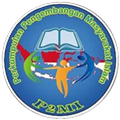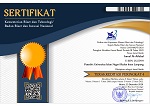IMPLEMENTASI PROGRAM KOTAKU MENYELESAIKAN PERSOALAN LINGKUNGAN KUMUH DI KRICAK YOGYAKARTA
Abstract
Kotaku is one of the programs launched and implemented by the local government to solve the problem of slum areas in Kricak, Tegalrejo, Yogyakarta. This study aims to determine the effectiveness of the program in overcoming environmental problems in the research location. This study uses a qualitative method with a naturalistic approach. Sources of data using primary and secondary data. Research data collection techniques through interviews, observation, and documentation. The validity of the data used triangulation. This study uses data analysis from the Miles and Huberman Model. Data analysis steps include data collection, data reduction, data presentation, and drawing conclusions. The results of the study indicate that the implementation of the Program Kotaku in the Kricak sub-district, Tegalrejo, Yogyakarta City has been running according to PU Number 40/SE/DC/2016. The implementation stage includes the socialization stage, the planning stage, the implementation stage and the sustainable stage. The impacts obtained from the arrangement of slum areas in the Kricak sub-district, Tegalrejo, Yogyakarta include changes in the physical environment to become more organized, clean and livable; raise public awareness to protect the environment together; and can improve the economy of the kricak community by utilizing public facilities that are well organized.
Keywords
Full Text:
PDFReferences
Adi, Alifiano Rezka, Penataan Kawasan Bantaran Sungai Menjadi Lebih
Ekologis, Kasus Bantaran Sungai Code,
www.kompasiana.com/AlifianRezkaAdi/penataan-kawasa
bantaran-sungai-code.
Agus, Erwan dan Dyah Ratih, Implementasi Kebijakan Publik: Konsep dan Aplikasinya di Indonesia, Yogyakarta: Grava Media, 2012
Cahyono, Joko Ari, Paparan Kebijakan Penanganan Kawasan Kumuh Dalam Diskusi Kawasan Kumuh di universitas Kristen dutawacana pada 1 Maret 2018. Yogyakarta. diakses pada tanggal desember 2020
Cholid dan Abu Ahmadi, Metodologi Penelitian, Jakarta: Bumi Aksara, 2010
Gil, Kawasan Kumuh Kota Yogyakarta tinggal 144 hektare, berita online, https://www.antaranews.com/berita/657343/akhir, 2017
Hadi, Sutrisno, Metedologi Reaserch II, Yogyakarta: Psikologi UGM, 1994
Hasanudin dan Ujang, Ini Dia Titik-Titik Kawasan Kumuh di Jogja, berita online, http://www.solopos.com/2018/01/13.
Idrus, Muhammad, Metode Penelitian Ilmu-Ilmu Social: Pendekatan Kualitatif dan Kuantitatif. Yogyakarta: UII Press, 2007
Miles dan Huberman, Analisis Data Kualitatif: Diterjemahkan oleh TjeTjep Rohedi Rosidi, Jakartara: Universitas Indonesia, 1992
Moleong, Metodologi Penelitian Kualitatif, Bandung: PT Remaja Rosda Karya, 2006
Nasir, Moh, Metode Penelitian, Jakarta: Ghali Indonesia, 1985
Nawawi, Hadari dan Mimi Martini, Penelitian Terapan, Yogyakarta: Gajah Mada University Press, 1990
Pedoman Umum Program Kota Tanpa Kumuh, Nomor 40/SE/DC/2016, diakses pada tanggal 4 Mei 2020
Prokotaku, Paket Informasi Program Kotaku, prokotaku.blogspot.co.id/2016/04/informasi-program-kotaku, diakses tanggal 10 Oktober, 2017
Rusqiyati, Eka Arifa. 12 Kelurahan Prioritas ‘Kotaku’ 2017 di Yogyakarta, http://www.antaranews.com/berita/616518/12-Kelurahan Prioritas-Kotaku-2017-di-Yogakarta.
Soetomo, Masalah Sosial dan Upaya Pemecahaannya, Yogyakarta: Pustaka Pelajar, cet II, 2010
Strauss, Anselm dan Juliet Corbin, Dasar-Dasar Penelitian Kualitatif. Yogyakarta: Pustaka Pelajar, 2007
Suharto, Edi, Analisis Kebijakan Publik: Panduan Praktis Mengkaji Masalah dan Kebijakan Sosial, Bandung: CV. Alfabeta, 2012
DOI: http://dx.doi.org/10.24042/ijpmi.v14i1.7968
Refbacks
- There are currently no refbacks.
Jurnal Ijtimaiyya is licensed under a Creative Commons Attribution-ShareAlike 4.0 International License.





1.png)
11.png)
.png)



